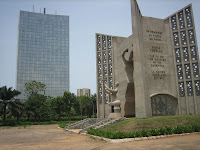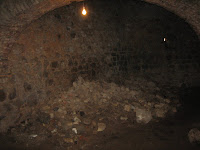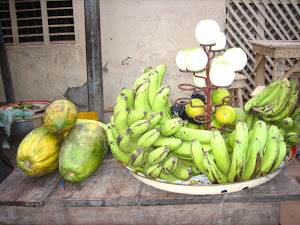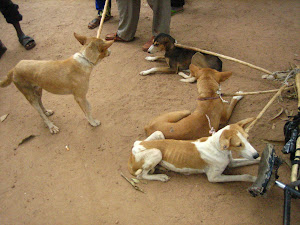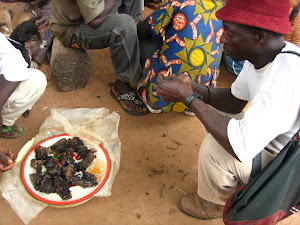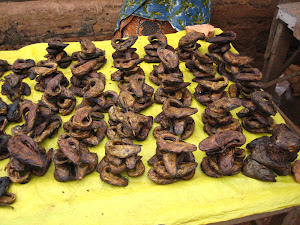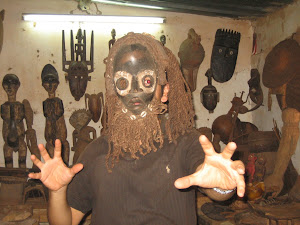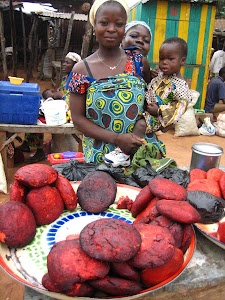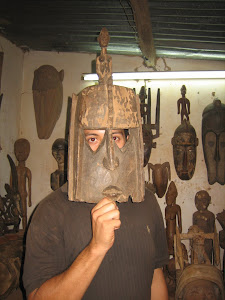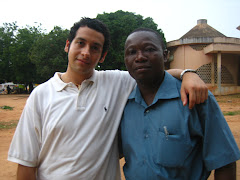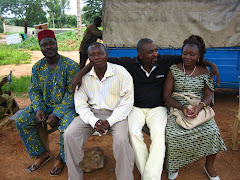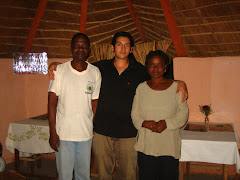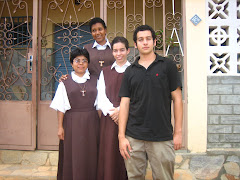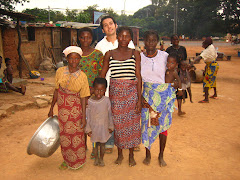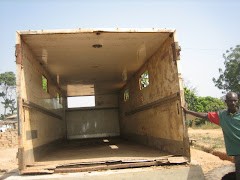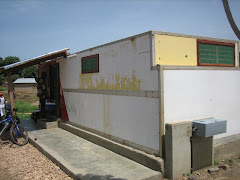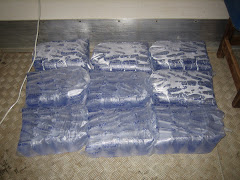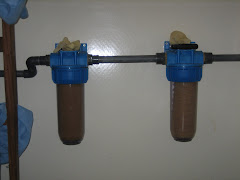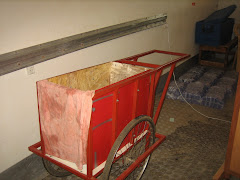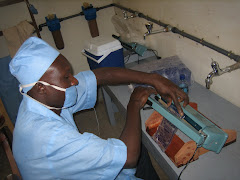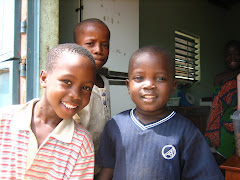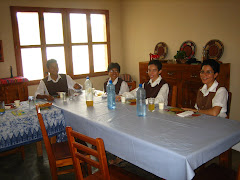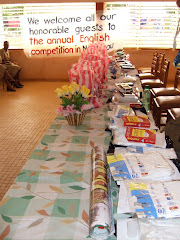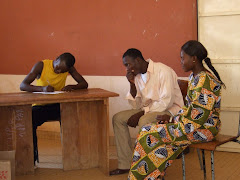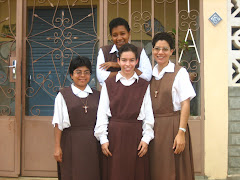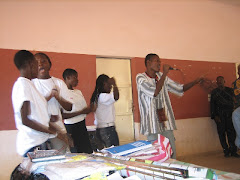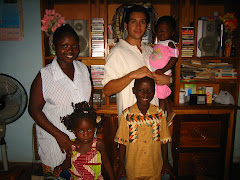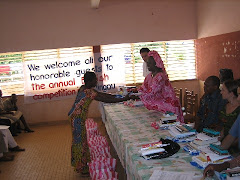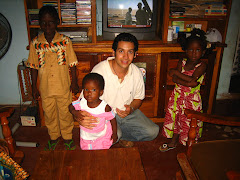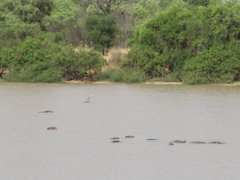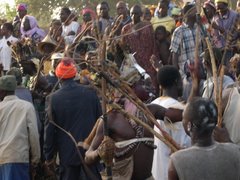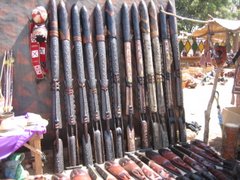 Since I arrived to Africa one of the first things that I noticed was that the life of African women is very difficult, burdensome and faces many obstacles at any age. At a young age African girls have a hard life, around the age of 5, young girls are responsible for taking care of their younger siblings, cooking cleaning doing laundry or selling water or fruit on the streets. It is typical to see young girls with babies strapped to their back, while doing chores or walking down the street with a large heavy tray filled with fruit. The chores they do are not as simple as the chores we have in the States or the developed world. For example, most houses do not have running water, therefore the girls have to go to wells or water pumps that are usually far and carry large basins of water on their head
Since I arrived to Africa one of the first things that I noticed was that the life of African women is very difficult, burdensome and faces many obstacles at any age. At a young age African girls have a hard life, around the age of 5, young girls are responsible for taking care of their younger siblings, cooking cleaning doing laundry or selling water or fruit on the streets. It is typical to see young girls with babies strapped to their back, while doing chores or walking down the street with a large heavy tray filled with fruit. The chores they do are not as simple as the chores we have in the States or the developed world. For example, most houses do not have running water, therefore the girls have to go to wells or water pumps that are usually far and carry large basins of water on their head  on a daily basis. There are no supermarkets or refrigerators so everything they cook has to be made from scratch, if the family wants to eat chicken, they are going to buy it, kill it, clean it and cook it. Houses are made of mud that easily crumb, so sweeping and cleaning the house can taking all day, washing machines do not exist here, and washing cloths by hand is a tedious job that wears down your hands, people are too poor to afford gas stoves, so just getting a fire started with wood or charcoal takes effort and time, these are just a few examples of daily chores that girls are expected to do.
on a daily basis. There are no supermarkets or refrigerators so everything they cook has to be made from scratch, if the family wants to eat chicken, they are going to buy it, kill it, clean it and cook it. Houses are made of mud that easily crumb, so sweeping and cleaning the house can taking all day, washing machines do not exist here, and washing cloths by hand is a tedious job that wears down your hands, people are too poor to afford gas stoves, so just getting a fire started with wood or charcoal takes effort and time, these are just a few examples of daily chores that girls are expected to do.

Education is not an option for most girls. Predominately families in villages do not send their
 daughters to school, because spending money and time on their education is seen as a waste since girls are usually married off at a young age and start having children. Parents think that girls are more valuable working at home and learning the skills of a wife, mother and caretaker. Schools in the cities or bigger towns are more likely to have more girls go to school, but as the grade level goes up there are fewer girls present. For example from 1st grade to 5th grade there are likely to be an equal number of boys to girls but, from 6th grade to 10th grade there are a couple of girls and beyond that there is only a handful. Then girls also face problems like teachers sleeping with them, getting them pregnant and leaving them, I was very surprised to find out that this is a common occurrence throughout schools in Africa.
daughters to school, because spending money and time on their education is seen as a waste since girls are usually married off at a young age and start having children. Parents think that girls are more valuable working at home and learning the skills of a wife, mother and caretaker. Schools in the cities or bigger towns are more likely to have more girls go to school, but as the grade level goes up there are fewer girls present. For example from 1st grade to 5th grade there are likely to be an equal number of boys to girls but, from 6th grade to 10th grade there are a couple of girls and beyond that there is only a handful. Then girls also face problems like teachers sleeping with them, getting them pregnant and leaving them, I was very surprised to find out that this is a common occurrence throughout schools in Africa. 
 Life only gets harder for women, they marry willingly or by force by their early to late teens, and then they start having children. In villages men have up to 4 wives; usually the fourth is a young adolescent girl. Health volunteers have told me that African women cannot refuse their husbands, and their husbands do not want them on birth control so the consequence is that they will have one child after another and this takes a heavy toll on their
Life only gets harder for women, they marry willingly or by force by their early to late teens, and then they start having children. In villages men have up to 4 wives; usually the fourth is a young adolescent girl. Health volunteers have told me that African women cannot refuse their husbands, and their husbands do not want them on birth control so the consequence is that they will have one child after another and this takes a heavy toll on their  bodies, but not even childbirth slows them down, they can have a baby one night and be back to cooking, chopping wood, doing chores and tending to their husband the next day. African women are incredibly strong in so many ways, they have the strength to strap a baby to their back and carry up to half their weight in coal, tree branches, logs, water, and other things on their head for long distances. On market days you can the parade of women with bright colourful clothing with incredible amounts of weight on their head to sale at the market. In bigger towns and cities girls can only find jobs at bars that pay minimum wage which is practically not a damn thing, tipping does not exist in Africa so they turn to prostitution or have to put up with the shit of stupid drunks hitting on them, because this is the only source of income to feed their children or family.
bodies, but not even childbirth slows them down, they can have a baby one night and be back to cooking, chopping wood, doing chores and tending to their husband the next day. African women are incredibly strong in so many ways, they have the strength to strap a baby to their back and carry up to half their weight in coal, tree branches, logs, water, and other things on their head for long distances. On market days you can the parade of women with bright colourful clothing with incredible amounts of weight on their head to sale at the market. In bigger towns and cities girls can only find jobs at bars that pay minimum wage which is practically not a damn thing, tipping does not exist in Africa so they turn to prostitution or have to put up with the shit of stupid drunks hitting on them, because this is the only source of income to feed their children or family.


